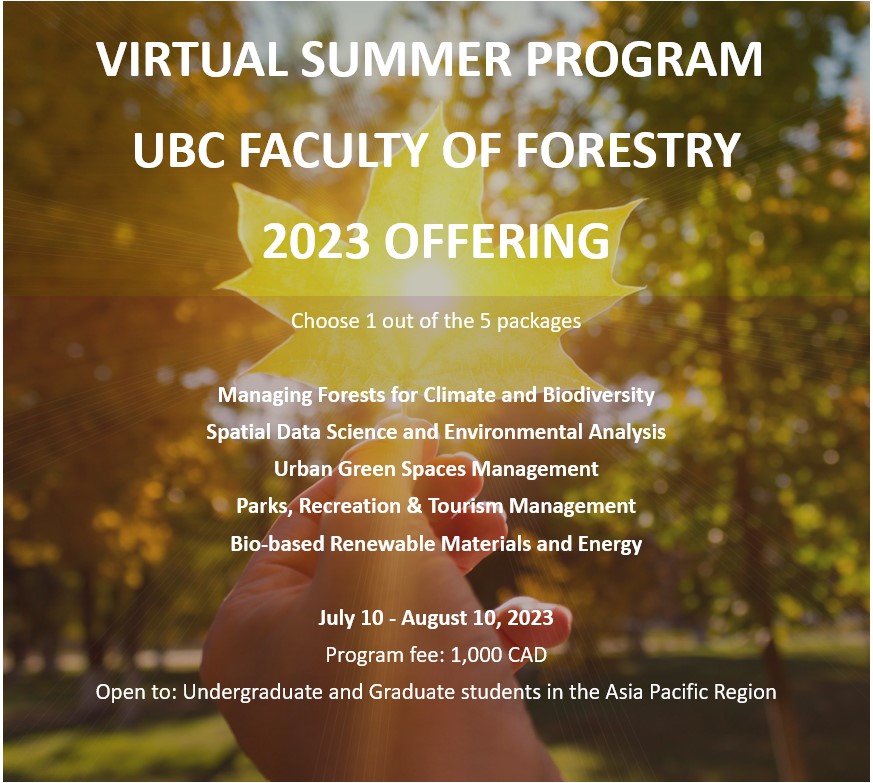We hosted our Virtual Summer Program between 2020 and 2022 under the phenomenon of the COVID-19 pandemic. Our programs were highly praised by students and teachers from our partner universities. To continue providing the alternative opportunity for the students to experience the teaching culture of UBC, the professional forest management of Canada, moreover the cultural diversity of Vancouver and the society of Canada, we plan to offer our next VSP in 2023. We will improve our programs based on the experience, aiming to bring all students an impressive and prosperous summer.
Registration is open until March 31, 2023.
The extension of the deadline will be considered if necessary.
Choose one package and apply online at
https://courses.cpe.ubc.ca/browse/ubcv/faculty-of-forestry/afrc/2023fvsp
CHOOSE 1 OUT OF THE 5 PACKAGES
PACKAGE 1 MANAGING FORESTS FOR CLIMATE AND DIVERSITY
Forests are the most biodiverse systems on land, with 80% of the world’s terrestrial biodiversity, supporting food and livelihoods for millions of people. Forest also contains about 50% of the global terrestrial biomass carbon stocks. However, forests have been experiencing massive deforestation and degradation, losing millions of hectares of forest each year, threatening ecosystem services of biodiversity and climate benefit that people have been enjoying for years. Hence, how we manage and interact with the forest is the key to accruing these biodiversity and climate benefits. In this course, students will learn about the forest as a natural-based solution to biodiversity and climate change and, how the forest can be managed for sustainable vital ecosystem services that are invaluable for human wellbeing. During the four weeks of learning, students will learn from synchronous and asynchronous online interaction with renowned professors and experts. To translate knowledge into practice, students will have various opportunities to apply learned knowledge by analyzing multiple case studies, group discussions, critical reflections, and presentations enhancing their critical thinking and communications skills.
PACKAGE 2 SPATIAL DATA SCIENCE AND ENVIRONMENTAL ANALYSIS
This course is designed to introduce students to the basic concepts and techniques of geospatial technology, including Geographic Information Systems (GIS) and remote sensing. You will learn how to integrate data science skills with geospatial data and the interpretation of results. Our course will also cover the use of geospatial technology for natural resources management. By the end of the course, you will have a solid understanding of the key concepts and techniques in geospatial technology, which will help you make informed decisions based on sound scientific principles in your work in natural resources management.
PACKAGE 3 URBAN GREEN SPACES MANAGEMENT
Urban forest networks, parks, wetlands, and other green infrastructures are vital in moderating heat waves and cooling demands, maintaining biodiversity and carbon sinks, controlling forest fires, storm-water flood mitigation, bio-energy production, etc. There is a growing need to adapt to multiple impacts of climate change; and increasing demand from the public for the recreational, psychological and health benefits that green-space networks provide. With increased urban populations, global warming, urban heat islands, flooding and pollution, cities may become unlivable or demand massive energy-use for cooling, unless we can establish large scale, healthy urban forest systems. This course will give the students an introduction to the importance of understanding Urban Forestry in the face of today’s rapid urbanization as forests and green systems compete for space among buildings, roads/transit, storage facilities, and energy infrastructure. In addition, this course includes case studies and tool applications in urban green space management.
PACKAGE 4 PARKS, RECREATION & TOURISM MANAGEMENT
The course covers the principles of tourism management, including destination development, marketing, and sustainable tourism practices. The course also covers park planning and design, recreational programming, tourism marketing, and resource management. Through a combination of classroom lectures and case studies, students will learn to effectively manage and promote parks, recreational facilities, and tourism destinations.
PACKAGE 5 BIO-BASED RENEWABLE MATERIALS AND ENERGY
The course emphasizes technical/scientific aspects of producing renewable bioproducts (e.g., bioenergy, biofuels, bio-based materials) derived from plant biomass to displace existing fossil-derived products. The course content will cover both biochemical (chemical treatments followed by enzyme-mediated bio-deconstruction) and thermochemical (thermo-conversion of biomass into solid, liquid and gas) approaches that produce these renewable products that have low carbon intensity.
ACTIVITIES
- Synchronous live lectures + Diverse live learning activities
- Synchronous cultural discovery
- Live presentation and experience sharing sessions about UBC, forestry faculty, Indigenous culture, Vancouver life and Canadian society
- Virtual tours of UBC campus, temperate rain forest and natural parks
Contact information
UBC Asia Forest Research Centre
Assistant Director
Dr Suzy (Xueqin) Zeng
Email: suzy.zeng@ubc.ca
